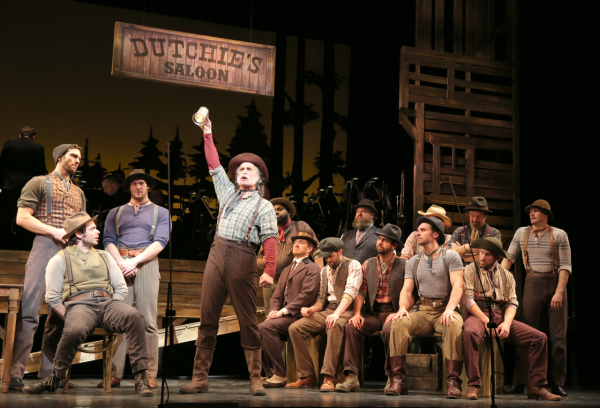Paint Your Wagon

(© Joan Marcus)
Few people are familiar with Alan Jay Lerner and Frederick Loewe's Paint Your Wagon, making it a perfect candidate for an Encores! concert at New York City Center. The show opened on Broadway in 1951 and closed the following year. It hasn't been revived since, and major regional productions are rare.
Audiences are more likely to know the 1969 film version, which improbably starred a singing, dancing Clint Eastwood. Lerner's book is almost unrecognizable in Paddy Chayefsky's screenplay about a polyamorous relationship on the frontier (which was perhaps developed to appeal to an emerging free love movement). Even though the hippies never particularly took to the film or Lerner and Loewe (the songwriting team behind My Fair Lady and Camelot), there are some undeniably winning numbers in Paint Your Wagon. What, then, could explain its absence from the stage? Viewers won't have to watch long to find out.
The story revolves around Ben Rumson (the delightfully grizzled Keith Carradine), a California prospector who strikes gold and founds an eponymous boomtown. Poor English, Irish, and Midwestern stereotypes flock to Rumson Creek to make their fortunes. The only problem is, they're all men and they're finding it hard to control their urges around the town's only female: Ben's 16-year-old daughter Jennifer (Alexandra Socha). Jennifer is indifferent to their advances until she meets Julio (Justin Guarini), a poor Mexican prospector living on the edge of town. She washes his clothes and he sweeps her off her feet.
When Mormon Jacob Woodling (William Youmans) arrives with his two wives, Sarah (Melissa van der Schyff) and Elizabeth (the hilarious Jenni Barber), Ben determines that it's unfair a man should have two of something that everyone else lacks. So Elizabeth immediately goes on the auction block and Ben places the winning bid. The other men will just have to settle for the local cathouse, which is set to open as soon as the next stagecoach rolls into town.
The number heralding its approach, the rollicking "There's a Coach Comin' In," is one of the show's most delightful — energetically performed by the stellar male ensemble. Choreographer Denis Jones gives that same chorus a workout with a second-act can-can that ends in a unisex kick line. Gorgeous Lerner and Loewe waltzes abound, including "All for Him" (sweetly interpreted by Socha) and "In Between" (given a folksy treatment by Carradine). Guarini does a charming rendition of "I Talk to the Trees," a song you will undoubtedly be humming onto West 55th Street.
The most impressive voice belongs to Nathaniel Hackmann, who lends his rich and resonant baritone to "They Call the Wind Maria." It's a haunting ballad with western inflections and a driving rhythm that sounds like manifest destiny slowly wheeling across the plains in a covered wagon. Under the steady baton of conductor Rob Berman, the orchestra offers a breathtaking performance of Loewe's richly symphonic music.
As directed by Marc Bruni, the cast mostly opts for caricature, employing some of the worst Irish and British dialects I've heard on the stage. Guarini smears his Mexican accent on thick, shortening his vowels and trilling his R's. In the future, he promises Jennifer, "I'll have enough to build my rrrrrancho." She swoons and we cringe.
A head shorter than everyone onstage and filled with bright-eyed wonder, Socha brings an unflappable girlishness to the role of Jennifer. By contrast, Guarini's Julio feels much older. And while Jennifer's costumes undergo a profound transformation (from tomboy to Eliza Doolittle), the characterization remains the same — uncomfortably adolescent.
It's possible to imagine a more mature portrayal of Jennifer, but it would necessarily be less truthful. Socha's performance unapologetically exposes the fossilized sexual politics peppered throughout the script. This is a story in which women are bought and sold as chattel, a stagecoach full of ladies is drafted into the best little whorehouse in California, and everyone has a toe-tapping good time doing it. That's likely to make many a modern theatergoer squirm in her seat.
Of course, our revulsion to the joyful misogyny of Paint Your Wagon says more about us than it does Lerner and Loewe or the corner of American history they attempted to musicalize. Until relatively recently, intergenerational relationships were hardly unusual. It may be that the true history of this once savage nation has become unpalatable for modern American audiences. Certainly, the barrel-chested gold miners depicted here bear little resemblance to the delicate and pampered Californians of 2015.
But if you can look beyond its sexual taboos (or at least learn to roll your eyes and chuckle), you'll find a hugely enjoyable musical in Paint Your Wagon. I don't expect it to pass through these parts again anytime soon, so you might want to catch it before it's gone.











